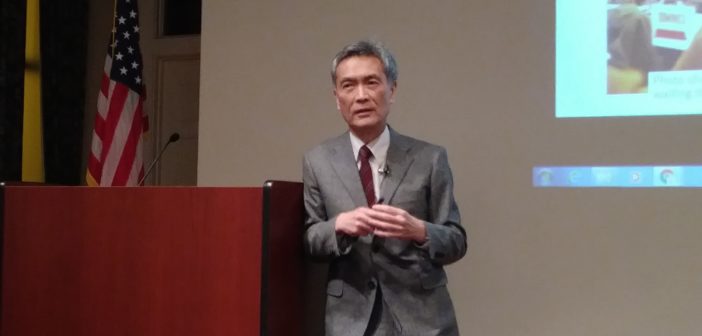Fulbright Scholar-in-residence Dr. Hikaru Kobayashi gave the second of this term’s four “Sustaining the Globe” presentations on Feb. 1, this time focusing on the Kyoto Protocol. According to the United Nations Framework Convention on Climate Change (UNFCCC), the Kyoto Protocol, established in 1997, is an international environment-protection agreement that “commits its Parties by setting internationally binding emission reduction targets.” Basically, it’s a global way to control and restrict harmful gaseous emissions, such as carbon dioxide (CO2) and chlorofluorocarbons (CFCs), into the atmosphere.
The protocol required that “each developed country shall reduce its 5 years overall ‘emissions’ from 2008 to 2012 not to exceed respective ‘assigned amount’ of GHGs emissions determined in the annex to the Protocol,” according to Kobayashi.
In the 20 years since the protocol was established, Kobayashi said that he is impressed with the progress that has been made, and for continued progression, “Developing countries are encouraged to move towards economy-wide emission reduction or limitation targets as similar as those of developed countries.”
To further assist the goal of slowing down or stopping climate change, there is an agreement within the UNFCCC that was established in 2015 called the Paris Agreement. The Paris Agreement (or Paris Accord) deals with mitigating greenhouse gas emissions.
“The Paris agreement raises the international standard policies by applying the duties borne by the developed countries under the UNFCCC to developing countries,” said Kobayashi. “As nationally determined contribution, all countries are to undertake ambitious efforts with the view to achieve the aims of this agreement.”
The Trump administration withdrew the U.S. from the Paris Agreement last year, making the United States now the only nation in the world not part of the accord. The president argued that the accord would undermine the economy and put the nation at a “permanent disadvantage.”
Kobayashi stressed that a “deep understanding of domestic difficulties associated with implementation of measures contributes to shaping good international measures,” and that it is important that all countries are actively participating in measures set by the protocol.
“There is no excuse not to take action,” said Kobayashi. “In this interdependent world, for the sake of our domestic success, we need to shape a better international agreement. It is vital.”

